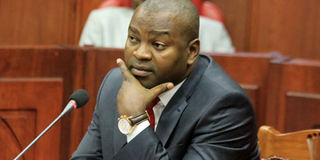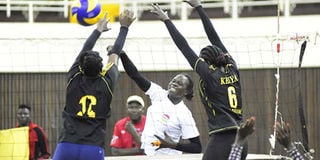National teams suffer as Sports fund remains a mirage

Sports and Heritage Cabinet Secretary Rashid Echesa during vetting by the National Assembly Committee on Appointment on February 9, 2018. The Sports CS is on the spotlight as national teams continue to suffer due to unfulfilled pledges made to sports enthusiasts by government. PHOTO | JEFF ANGOTE |
What you need to know:
- The Malkia Strikers were to leave for Japan on Tuesday evening but the ministry failed to provide the tickets on time, forcing a postponement of the departure date to Thursday evening
- Apart from volleyball, the national amputee football team has issued a passionate appeal to government to help them honour the Amputees World Cup at a cost of Sh18 million
- The national football team is also in a dilemma as there are no funds to prepare for the home and away 2019 Africa Cup of Nations qualifying matches against Ethiopia which are scheduled for October 10 and 14
- When the National Sports Fund was signed into law five years ago, it was tabled forward as a solid solution to the deep financial problems that athletes, clubs and federations endure from time to time
The long road towards operationalizing the Sports Fund is littered with broken promises.
The Sh500 million fund that was promised by Deputy President William Ruto at the beginning of this year has now become one in a list of many unfulfilled pledges made to sports enthusiasts by government.
This has resulted in national teams having to endure excruciating conditions while preparing for national team duty.
The national volleyball team, which has brought the country immense pride over the years and who are revered across borders as the queens of Africa, have had messy preparations in the run up to the 2018 FIVB Volleyball Women's World Championship.
In the one month that they have been in residential camp at Kasarani, the Malkia Strikers’ training schedule has involved friendlies with men and women’s teams from the local league.

Malkia Strikers' Mercy Moim (centre) spikes against Kenya Prisons' Meldina Sande (left) and Joy Lusenaka during their friendly match at the Kasarani Indoor Arena on September 12, 2018. PHOTO | CHRIS OMOLLO |
Cameroon, the other African representatives in that global competition, participated in the Montreux Volley Masters women’s tournament in Switzerland; an international friendly tournament that brings together top continental teams ahead of the World Championships.
They tested themselves against tough opponents Brazil, Russia and Poland despite losing all their Pool B matches in straight sets. They have since stepped up preparations with specialized training in Italy.
The team was to leave for Japan on Tuesday evening but the ministry failed to provide the tickets on time, forcing a postponement of the departure date to Thursday evening.
“The only thing we have is support from the fans, and from National Oil who are our sponsors. I am sure if our fans had money they would sponsor us so that we could have more befitting preparations," said award winning setter Jane Wacu.
Apart from volleyball, the national amputee football team has issued a passionate appeal to government to help them honour the Amputees World Cup set for October 24-November 5 in Mexico at a cost of Sh18 million.

Football Kenya Federation President Nick Mwendwa talks to Harambee Stars players after a training session at the Kenya School of Monetary Studies, Nairobi on September 9, 2018. PHOTO | KANYIRI WAHITO |
The national football team, Harambee Stars, is also in a dilemma as there are no funds to prepare for the home and away 2019 Africa Cup of Nations qualifying matches against Ethiopia which are scheduled for October 10 and 14.
On Tuesday, parliament was debating a proposal re-introduced by President Uhuru Kenyatta to reduce tax on gaming from 35 per cent to 15 per cent. This has left many wondering where that would leave the Sports Fund that was to be sustained by monies gotten from betting tax.
When the National Sports Fund was signed into law five years ago, it was tabled forward as a solid solution to the deep financial problems that athletes, clubs and federations endure from time to time.
The sports fund was established under the Sports Act 2013, and was meant to be a collective pool of financial resources from which all Kenyan athletes and federations could secure funding to adequately prepare and participate in various competitions or qualifiers.
Kenya was to follow the 21-year old UK model, which was ranked the most successful in this particular matter, with money from the National Lottery (established under the sports fund) being distributed to independent organisations or registered federations.
A 14-member Board of Trustees comprising of representatives from the sports ministry, the government, the Director General of Sports Kenya, the Chief Executive Officer of the Kenya Academy of Sports, as well as the Attorney General, would then proceed to track the performance of the athletes under their stable to evaluate the success or lack thereof of the project and to identify areas for improvements in future.
Government would provide the seed money with treasury providing the bulk of funding in the first year of implementation, after which the lottery would grow into a self-sustainable entity with monies from various sports investors (including gaming and betting companies).
All this has however failed to take off, as sports development works in various stadiums have also stalled despite the ministry’s promises that the venues would be completed by June this year.
Contractors who won tenders to renovate various stadia are owed more than Sh500million and construction works at Nyayo Stadium, Kinoru Stadium and Kipchoge Keino stadiums have all stalled with contractors leaving the site at Nyayo due to non-payment of dues.
Officials from the ministry were unavailable for comment at the time of going to press.





